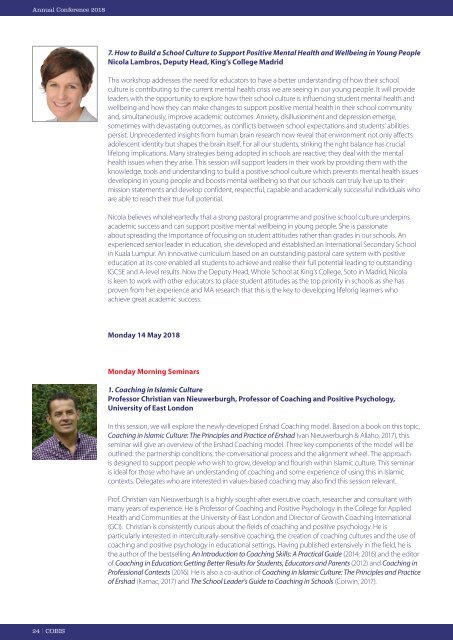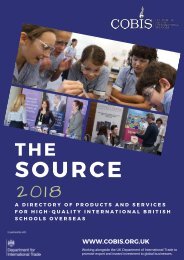COBIS Annual Conference Programme 2018
Create successful ePaper yourself
Turn your PDF publications into a flip-book with our unique Google optimized e-Paper software.
<strong>Annual</strong> <strong>Conference</strong> <strong>2018</strong><br />
<strong>Annual</strong> <strong>Conference</strong> <strong>2018</strong><br />
7. How to Build a School Culture to Support Positive Mental Health and Wellbeing in Young People<br />
Nicola Lambros, Deputy Head, King’s College Madrid<br />
This workshop addresses the need for educators to have a better understanding of how their school<br />
culture is contributing to the current mental health crisis we are seeing in our young people. It will provide<br />
leaders with the opportunity to explore how their school culture is influencing student mental health and<br />
wellbeing and how they can make changes to support positive mental health in their school community<br />
and, simultaneously, improve academic outcomes. Anxiety, disillusionment and depression emerge,<br />
sometimes with devastating outcomes, as conflicts between school expectations and students’ abilities<br />
persist. Unprecedented insights from human brain research now reveal that environment not only affects<br />
adolescent identity but shapes the brain itself. For all our students, striking the right balance has crucial<br />
lifelong implications. Many strategies being adopted in schools are reactive; they deal with the mental<br />
health issues when they arise. This session will support leaders in their work by providing them with the<br />
knowledge, tools and understanding to build a positive school culture which prevents mental health issues<br />
developing in young people and boosts mental wellbeing so that our schools can truly live up to their<br />
mission statements and develop confident, respectful, capable and academically successful individuals who<br />
are able to reach their true full potential.<br />
Nicola believes wholeheartedly that a strong pastoral programme and positive school culture underpins<br />
academic success and can support positive mental wellbeing in young people. She is passionate<br />
about spreading the importance of focusing on student attitudes rather than grades in our schools. An<br />
experienced senior leader in education, she developed and established an International Secondary School<br />
in Kuala Lumpur. An innovative curriculum based on an outstanding pastoral care system with positive<br />
education at its core enabled all students to achieve and realise their full potential leading to outstanding<br />
IGCSE and A-level results. Now the Deputy Head, Whole School at King’s College, Soto in Madrid, Nicola<br />
is keen to work with other educators to place student attitudes as the top priority in schools as she has<br />
proven from her experience and MA research that this is the key to developing lifelong learners who<br />
achieve great academic success.<br />
Monday 14 May <strong>2018</strong><br />
Monday Morning Seminars<br />
1. Coaching in Islamic Culture<br />
Professor Christian van Nieuwerburgh, Professor of Coaching and Positive Psychology,<br />
University of East London<br />
In this session, we will explore the newly-developed Ershad Coaching model. Based on a book on this topic,<br />
Coaching in Islamic Culture: The Principles and Practice of Ershad (van Nieuwerburgh & Allaho, 2017), this<br />
seminar will give an overview of the Ershad Coaching model. Three key components of the model will be<br />
outlined: the partnership conditions, the conversational process and the alignment wheel. The approach<br />
is designed to support people who wish to grow, develop and flourish within Islamic culture. This seminar<br />
is ideal for those who have an understanding of coaching and some experience of using this in Islamic<br />
contexts. Delegates who are interested in values-based coaching may also find this session relevant.<br />
Prof. Christian van Nieuwerburgh is a highly sought-after executive coach, researcher and consultant with<br />
many years of experience. He is Professor of Coaching and Positive Psychology in the College for Applied<br />
Health and Communities at the University of East London and Director of Growth Coaching International<br />
(GCI). Christian is consistently curious about the fields of coaching and positive psychology. He is<br />
particularly interested in interculturally-sensitive coaching, the creation of coaching cultures and the use of<br />
coaching and positive psychology in educational settings. Having published extensively in the field, he is<br />
the author of the bestselling An Introduction to Coaching Skills: A Practical Guide (2014; 2016) and the editor<br />
of Coaching in Education: Getting Better Results for Students, Educators and Parents (2012) and Coaching in<br />
Professional Contexts (2016). He is also a co-author of Coaching in Islamic Culture: The Principles and Practice<br />
of Ershad (Karnac, 2017) and The School Leader’s Guide to Coaching in Schools (Corwin, 2017).<br />
2. How Can International Schools Identify and Respond to Adults Who Pose a Risk of Harm to<br />
Students?<br />
Katie Rigg, Associate and Jane Foster, Consultant, Safeguarding Unit, Farrer & Co<br />
This session will look at safeguarding risks and vulnerabilities in the international school context, and<br />
preventing and identifying abuse within schools. The session will also review a new international protocol<br />
for responding to allegations of abuse.<br />
Katie Rigg is an Associate in the Safeguarding Unit at Farrer & Co. Her practice spans safeguarding and child<br />
protection, education and employment law. Katie advises and delivers training to a range of organisations<br />
(including schools, charities, sports clubs, universities and religious organisations) on safeguarding and<br />
child protection matters. This includes advice on the design and implementation of effective safeguarding<br />
policies and practices, responding to concerns or allegations against adults or other children and creating<br />
and maintaining a safe organisational culture. Katie has a particular interest in international children’s rights<br />
and child protection and regularly advises schools and other organisations based outside the United<br />
Kingdom. She is also undertaking a professional doctorate at the International Centre for Research into Child<br />
Sexual Exploitation, Violence and Trafficking, focusing on peer-on-peer abuse, and the external challenges<br />
faced by international schools operating in environments without effective law enforcement and/or child<br />
protection agencies.<br />
Jane Foster was, until July 2016, the Tri-Borough (Royal Borough of Kensington and Chelsea, London<br />
Borough of Hammersmith and Fulham and City of Westminster) Safe Organisations Manager and Local<br />
Authority Designated Officer (LADO). As Tri-Borough LADO and co-ordinator of the Pan-London LADO<br />
network Jane played a key role in keeping many of London’s children safe and is a well-known figure to<br />
many private, public and third sector organisations working with children, including state, independent and<br />
international schools. Jane has considerable experience in delivering training to professionals working with<br />
children, having designed and delivered safeguarding training for Local Children Safeguarding Boards in<br />
both England and Wales; she is also an accredited Safer Recruitment trainer. Jane was a panel member on<br />
Dame Moira Gibb’s 2016 Serious Case Review and is working (alongside other members of the Farrer and Co<br />
Safeguarding Unit) with the International Task Force for Child Protection<br />
3. Assessment Data for Leadership: How School Leaders are Driving Improvement Through<br />
Effective Use of Assessment Data<br />
Panel chaired by James Neill, International Director, GL Education Group<br />
Three senior leaders will outline how effective use of assessment data is essential to enable them to address<br />
the demands of internal and external stakeholders including students, parents and inspectors to ensure that<br />
their school continues to exceed expectations academically and pastorally whilst building their reputation.<br />
A panel discussion and general Q&A will then address specific challenges such as: self-evaluation<br />
and accreditations; inclusion and student wellbeing; personalised learning and student ownership of<br />
expectations; staff engagement and development.<br />
The panel will explain how data has informed specific changes to the way teaching and learning takes<br />
place in their classrooms, and the impact these changes have had, providing delegates with practical ideas<br />
to take away and implement in their own schools. Panellists will include Matthew Savage, Principal, The<br />
International Community School, Amman; Karen Jones, Academic Director, Intuitive Education Consultants;<br />
and Matthew Dagan, Primary Deputy Principal, Riverside School, Prague.<br />
James Neill is the International Director at the GL Education Group. He has taught Physics and Science in<br />
both UK and International schools. Upon leaving teaching James joined Pearson Edexcel where he worked<br />
with schools and stakeholders in England and in the Middle East to support curriculum development, as<br />
well as supporting teachers in using data and technology to raise attainment. James has also worked with<br />
organisations to develop admissions tests for university courses, as well as developing online assessment<br />
solutions for professional organisations.<br />
24<br />
<strong>COBIS</strong><br />
<strong>COBIS</strong><br />
25





